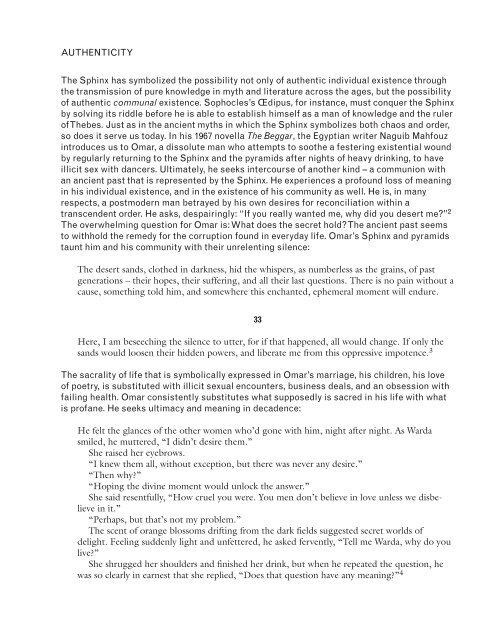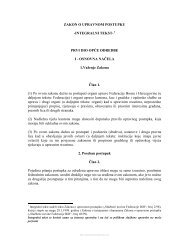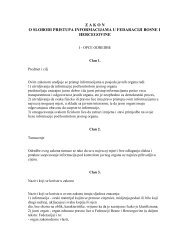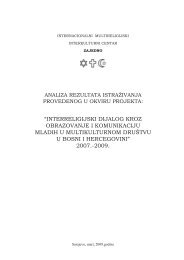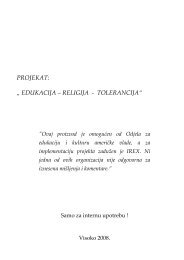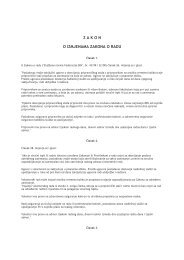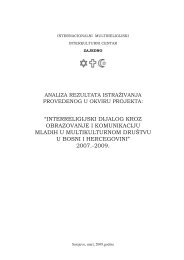AUTHENTICITYThe Sphinx has symbolized the possibility not only of authentic individual existence throughthe transmission of pure knowledge in myth <strong>and</strong> literature across the ages, but the possibilityof authentic communal existence. Sophocles’s Œdipus, for instance, must conquer the Sphinxby solving its riddle before he is able to establish himself as a man of knowledge <strong>and</strong> the rulerof Thebes. Just as in the ancient myths in which the Sphinx symbolizes both chaos <strong>and</strong> order,so does it serve us today. In his 1967 novella The Beggar, the Egyptian writer Naguib Mahfouzintroduces us to Omar, a dissolute man who attempts to soothe a festering existential woundby regularly returning to the Sphinx <strong>and</strong> the pyramids after nights of heavy drinking, to haveillicit sex with dancers. Ultimately, he seeks intercourse of another kind – a communion withan ancient past that is represented by the Sphinx. He experiences a profound loss of meaningin his individual existence, <strong>and</strong> in the existence of his community as well. He is, in manyrespects, a postmodern man betrayed by his own desires for reconciliation within atranscendent order. He asks, despairingly: “If you really wanted me, why did you desert me?” 2The overwhelming question for Omar is: What does the secret hold? The ancient past seemsto withhold the remedy for the corruption found in everyday life. Omar’s Sphinx <strong>and</strong> pyramidstaunt him <strong>and</strong> his community with their unrelenting silence:The desert s<strong>and</strong>s, clothed in darkness, hid the whispers, as numberless as the grains, of pastgenerations – their hopes, their suffering, <strong>and</strong> all their last questions. There is no pain without acause, something told him, <strong>and</strong> somewhere this enchanted, ephemeral moment will endure.33Here, I am beseeching the silence to utter, for if that happened, all would change. If only thes<strong>and</strong>s would loosen their hidden powers, <strong>and</strong> liberate me from this oppressive impotence. 3The sacrality of life that is symbolically expressed in Omar’s marriage, his children, his loveof poetry, is substituted with illicit sexual encounters, business deals, <strong>and</strong> an obsession withfailing health. Omar consistently substitutes what supposedly is sacred in his life with whatis profane. He seeks ultimacy <strong>and</strong> meaning in decadence:He felt the glances of the other women who’d gone with him, night after night. As Wardasmiled, he muttered, “I didn’t desire them.”She raised her eyebrows.“I knew them all, without exception, but there was never any desire.”“Then why?”“Hoping the divine moment would unlock the answer.”She said resentfully, “How cruel you were. You men don’t believe in love unless we disbelievein it.”“Perhaps, but that’s not my problem.”The scent of orange blossoms drifting from the dark fields suggested secret worlds ofdelight. Feeling suddenly light <strong>and</strong> unfettered, he asked fervently, “Tell me Warda, why do youlive?”She shrugged her shoulders <strong>and</strong> finished her drink, but when he repeated the question, hewas so clearly in earnest that she replied, “Does that question have any meaning?” 4
The question he asks his dancer is the question that plagues his own existence <strong>and</strong> theexistence of the community. In the end, however, Omar remains a beggar for meaning <strong>and</strong>value. The secret is never released to him <strong>and</strong> an authentic existence is never within hisgrasp. Not only does Warda refuse to answer his question meaningfully, but she allows thequestion to fall in on itself: the question, we see through her eyes, has no meaning.The implication of Omar’s desire for authenticity takes on a new meaning in light ofpostmodernism. Mahfouz, however unintentionally, has captured a sense of postmodernismthat, as a philosophical venture, is contrary to what Lévi-Strauss defined as the “ultimategoal of the human sciences” – the constitution of man. The postmodern dissolution of man orthe human subject is a fracturing of the center, the megaliths, the structures of language <strong>and</strong>culture which, over the centuries in Western civilization, have provided a space for the sacred<strong>and</strong> have grounded the authentic individual <strong>and</strong> collective identities that flow from it; or, asexpressed in T.S. Eliot’s The Waste L<strong>and</strong>, “These fragments I have shored against my ruins.” 5 Itis precisely modernism’s fragmentation <strong>and</strong> subsequent desire for, <strong>and</strong> firm belief in,reunification that postmodernism oddly commemorates as the immemorial – the absencepresent in ruins <strong>and</strong> the secret that is never divulged by the Sphinx. The fragments of the(im)memorials of the past <strong>and</strong> present point in the direction of a center that the humansubject has made its own by a process of unification, individualization, <strong>and</strong> internalization bydislocating the sacred from the outside of existence (an object-dominated world) to humanconsciousness (a subject-dominated world).This center regularly appears in Western philosophy as the bi-partition of the world, therealm of the Forms <strong>and</strong> the realm of sensible things; we find the transcendent sacredexpressed in the profane; we find also the sacred, representing power <strong>and</strong> ultimacy,anchoring the subject <strong>and</strong>, in doing so, giving meaning <strong>and</strong> value to human existence. Thisdialectical separation that is posited at the center of human existence comes to fullerexpression in René Descartes’s seminal philosophical treatise Meditations on FirstPhilosophy (In Which the Existence of God <strong>and</strong> the Distinction of the Soul from the Body AreDemonstrated). As Charles E. Winquist notes in Desiring Theology, modern philosophy“begins with a search for roots or foundations of knowledge.” 6 This search for knowledge,however, finds its beginning in the contaminate of radical doubt, a contaminate thatDescartes <strong>and</strong> modern philosophy were unable to purify with a transcendent order oruniversal human subjectivity. Winquist goes on to add:34God is a figuration within subjective discourse that disrupts hegemony of the subject over allexperience. God means what discourse is not. The conceiving of God is an argument againstidealistic solipsism. It enfranchises consideration of that which is other than subjectivity fromwithin subjectivity. This sense of the other is a theological exigency of the mind. Talk of God isincorrigible to the assertion of subjective dominance. 7Descartes ends, as Winquist points out, with a “world smaller than the world that he beganwith.” 8 Descartes inverts the world of objects <strong>and</strong>, in so doing, expresses the “new” world asa function of God, which is actually an extension of subjectivity. In this logical arrangement,the world <strong>and</strong> the concept of “Other” exist as thinly disguised projections of the sovereignsubject:
- Page 2: PARA/INQUIRY“For those of us who
- Page 5 and 6: First published 2000by Routledge11
- Page 8 and 9: CONTENTSList of figures ixAcknowled
- Page 10: FIGURES3.1 Questioner of the Sphinx
- Page 14: Posting
- Page 17 and 18: meaning that founds philosophical i
- Page 20: CHAPTER 1Paralogies
- Page 23 and 24: Lyotard’s enjeu, Deleuze and Guat
- Page 25 and 26: In his book Pararealities: The Natu
- Page 27 and 28: acquittal. The horror of the text i
- Page 29 and 30: writer therefore work without rules
- Page 32: CHAPTER 2Parastructures of the sacr
- Page 35 and 36: In this critical space opened by Ni
- Page 37 and 38: Joyce’s Finnegans Wake the exempl
- Page 39 and 40: Deservedly confin’d into this roc
- Page 41 and 42: story of the sacred? Is there but o
- Page 44 and 45: The aspects of things that are most
- Page 48 and 49: The fact that I exist and have an i
- Page 50 and 51: connection with the Columbian Expos
- Page 52 and 53: through the sacred, so does the com
- Page 54 and 55: appropriation of his thought and of
- Page 56 and 57: use or civil meaning of the word (t
- Page 58 and 59: does not mean that one is sidestepp
- Page 60: of the twentieth century. As Lyotar
- Page 64 and 65: The sacred of the archaic world was
- Page 66 and 67: possibility for an expression of ex
- Page 68 and 69: the actual frame of the panels, the
- Page 70 and 71: space of the painting, and, second,
- Page 72 and 73: much a part of scholarship today. A
- Page 74 and 75: not merely interesting footnotes to
- Page 76 and 77: many to see Eliade as a mystic who
- Page 78 and 79: phenomenology. Eliade’s arrival i
- Page 80 and 81: of the sacred as a child in Romania
- Page 82 and 83: discursive structure to relinquish
- Page 84 and 85: autonomy of the work of art. But ha
- Page 86: CHAPTER 5Para Shoah
- Page 89 and 90: Faurisson reveals that the Shoah is
- Page 91 and 92: MEMORIES OF FORGETTINGCertainty is
- Page 93 and 94: political. Each of these ground(ing
- Page 95 and 96: totalizing discourses or a determin
- Page 97 and 98:
Kantian wound often move toward a q
- Page 99 and 100:
Secret fauna and flora which the re
- Page 102:
CHAPTER 6Parasacred ground(ing)s
- Page 105 and 106:
often exist outside (the pagus) the
- Page 107 and 108:
graveyard. The sacred disfigures,be
- Page 109 and 110:
death, which is another repetition
- Page 111 and 112:
able to choose from a range of poss
- Page 113 and 114:
eligious. Mary’s presence as a mi
- Page 115 and 116:
As one walks through a cemetery, ti
- Page 117 and 118:
104Figure 6.15b Clinging to the Cro
- Page 120 and 121:
To think not is to linger with a ne
- Page 122 and 123:
PARASACRED IMAGESNor does one need
- Page 124 and 125:
irreverent piety in so far as eachr
- Page 126:
CHAPTER 8EpilogueParaultimacy
- Page 129 and 130:
The steps, the corridor, to the plo
- Page 131 and 132:
GLOSSARYI should say that in so far
- Page 133 and 134:
The early writings of the French ph
- Page 135 and 136:
NOTESPOSTING1 Michel Montaigne, Apo
- Page 137 and 138:
metaphysical notion of effectivespa
- Page 139 and 140:
and probably goes back to helios.Ea
- Page 141 and 142:
“compensate” the rigidity of th
- Page 143 and 144:
GLOSSARY1 Peter A. Angeles writes(H
- Page 145 and 146:
Stanford: Stanford University Press
- Page 147 and 148:
Riverside Shakespeare edn, Boston:H
- Page 149 and 150:
Carroll, Lewis 23cemeteries 93, 101
- Page 151 and 152:
painting 58; laughter as epiphany 5
- Page 153 and 154:
“paraexperience” 83, 86; the po
- Page 155 and 156:
postmodernism: authenticity 33;ceme
- Page 157 and 158:
Thousand Plateaus, A (Gilles Deleuz


